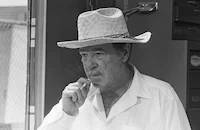They Call Me MISTER Tibbs

Brief Synopsis
Cast & Crew
Gordon Douglas
Sidney Poitier
Martin Landau
Barbara Mcnair
Anthony Zerbe
Jeff Corey
Film Details
Technical Specs

Synopsis
Det. Lieut. Virgil Tibbs of the San Francisco homicide squad receives an anonymous phone call accusing his close friend, community activist Rev. Logan Sharpe, of murdering a prostitute. The detective questions the clergyman, who admits having visited the victim to bestow pastoral counsel. Other suspects include Rice Weedon, a landlord and narcotics dealer whom Tibbs shoots in self-defense; black janitor Mealie; and Woody Garfield, the victim's protector. Again confronted by Tibbs, Sharpe confesses his guilt, revealing that the prostitute had mocked his sexual prowess, and begging Tibbs to defer arrest until after a referendum on a community control issue Sharpe supports. When the officer refuses, the activist throws himself under a passing truck.

Director

Gordon Douglas
Cast

Sidney Poitier

Martin Landau

Barbara Mcnair

Anthony Zerbe

Jeff Corey
David Sheiner

Juano Hernandez
Norma Crane
Edward Asner
Ted Gehring
Beverly Todd
Linda Towne
George Spell
Wanda Spell

Henry Leff
Garry Walberg
Crew
John A. Anderson
Malcolm Atterbury Jr.
Larry Barbier
Edward G. Boyle
Fred Brost
Roy Clark
Elizabeth Darcy
Hal De Windt
Gerald Finnerman
Al Fleming
William Gallant
Justus Gibbs
Bert Hallberg
Addison Hehr
Herbert Hirschman
Joe Jackman
Quincy Jones
William Maldonado
Robert Martin
James F. Mcguire
Rusty Meek
Ruth M. Miller
Walter Mirisch
Bud Molin
Edward Morey Jr.
Ed Mullay
Richard Neff
Terence Nelson
Tony Pistone
Paul Pollard
George Rader
Neva Rames
Mark Reedall
Irving Rosenblum
Robert Schultz
Ermon Session
Brad Six
Lynn Stalmaster
Alan R. Trustman
Alan R. Trustman
Frank Warner
Hal Washburn
James R. Webb
Norman Webster
Clifford Yates

Film Details
Technical Specs

Articles
They Call Me MISTER Tibbs!
By 1970, Tibbs' situation had changed somewhat; the policeman had relocated to San Francisco and was faced with problems at home, with a rocky marriage and a rebellious adolescent son. When he's assigned to the murder of a prostitute, all the evidence points towards his friend, Reverend Logan Sharpe (Martin Landau). They Call Me MISTER Tibbs! dispenses with much of In The Heat of the Night's racial complexities (with no Steiger to serve as Poitier's foil), and winds up more along the lines of a pure action picture. With Quincy Jones' funky score and Tibbs' early-Seventies fashions, it almost has the feel of a 'blaxploitation' film from the period.
Director Gordon Douglas, veteran of films such as Slaughter's Big Rip-Off (1973), Robin and the 7 Hoods (1964) and the Fifties big-bug saga Them! (1954) provided plenty of punch for Tibbs' action segments. Don't go in expecting a great deal of social commentary, and They Call Me MISTER Tibbs! delivers a satisfying bill of goods.
Director: Gordon Douglas
Producer: Herbert Hirschman, Walter Mirisch (executive)
Screenplay: Alan Trustman, James R. Webb
Cinematography: Gerald Perry Finnerman
Music: Quincy Jones
Art Direction: Addison Hehr
Cast: Sidney Poitier (Lieutenant Virgil Tibbs), Martin Landau (Reverend Logan Sharpe), Barbara McNair (Valerie Tibbs), Anthony Zerbe (Rice Weedon), Edward Asner (Woody Garfield), Jeff Corey (Captain Hank Marden), Norma Crane (Marge Garfield).
C-108m. Letterboxed. Closed captioning.
by Jerry Renshaw

They Call Me MISTER Tibbs!
Quotes
Trivia
Notes
Location scenes filmed in San Francisco. Sidney Poitier had originated the role of "Virgil Tibbs" in 1967's In the Heat of the Night and revised the role in 1971's The Organization. They Call Me MISTER Tibbs marked the last film appearance of noted African-American character actor Juano Hernandez (1901-1970).

Miscellaneous Notes
Released in United States 1970
Sequel to "In the Heat of the Night" (1967) directed by Norman Jewison.
Released in United States 1970













